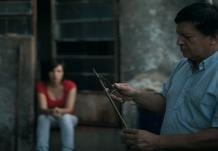When Paraguayan filmmaker Renate Costa discovers her gay uncle has died, her grief is compounded by the fact that he was largely estranged from – and oppressed by – his deeply religious family.
On the morning of Rodolpho’s death, she immediately grabs her camera and attempts to learn more about the extent of his oppression and the reasons behind the family’s division.
One of the key threads begins to unravel when the filmmaker discovers a sinister list dubbed “108” that Rodolfo was on – a list the Paraguayan dictatorship compiled to identify known homosexuals. Police routinely used the 108 to round up and repeatedly torture gays for indefinite periods. To this day, Paraguayan queers dread the number, which is featured in graffiti as a defiant memorial.
The hateful homophobia of the filmmaker’s father is difficult to watch. He tells stories of physically attacking his brother’s close queer friends, to scare Rodolfo into heterosexuality. In one of many denial-filled, seemingly reflective moments, he says of his brother, “They say he died of sadness. That’s what I’ve tried to understand, because he didn’t seem very sad.” While a relatively interesting tale, 108 could have been about half the length. Too much time is devoted to scenes where father and daughter literally stare in silence and frustration at each other.
VIFF 2010: 108

A scene from 108 Credit: Courtesy of the Vancouver International Film Festival
Advertisement
Keep Reading
Advertisement
 Why you can trust Xtra
Why you can trust Xtra


